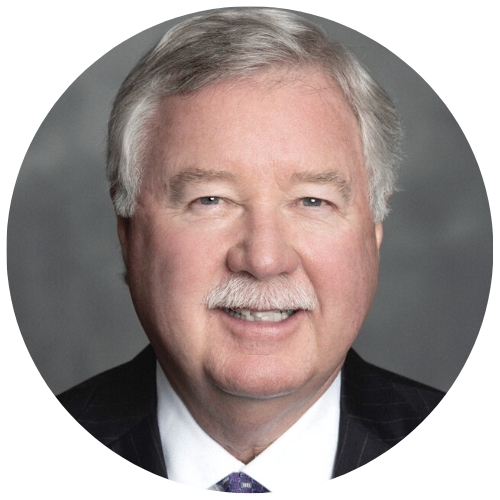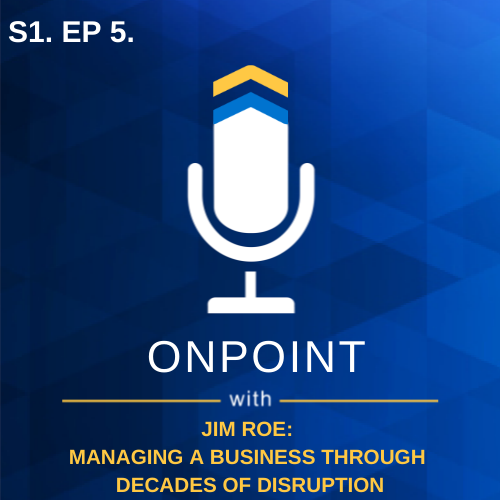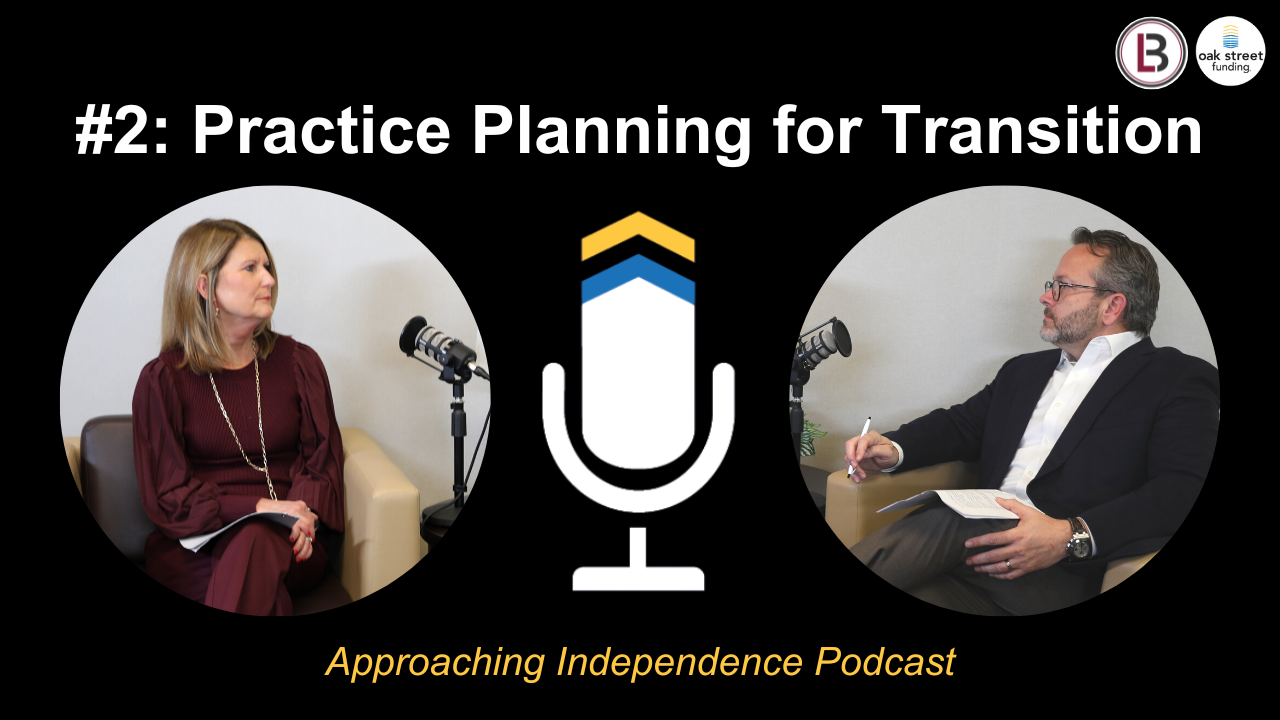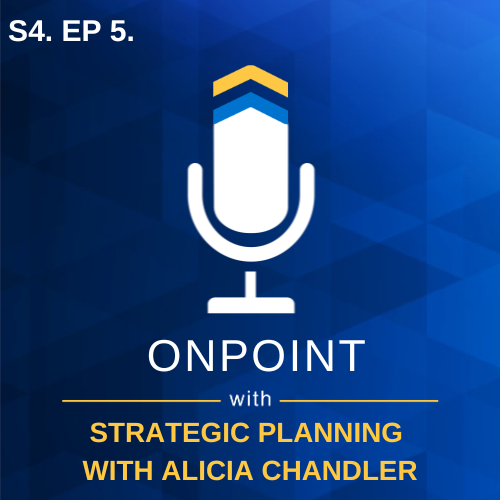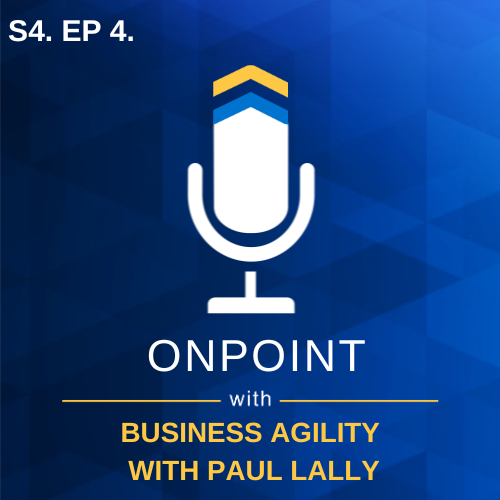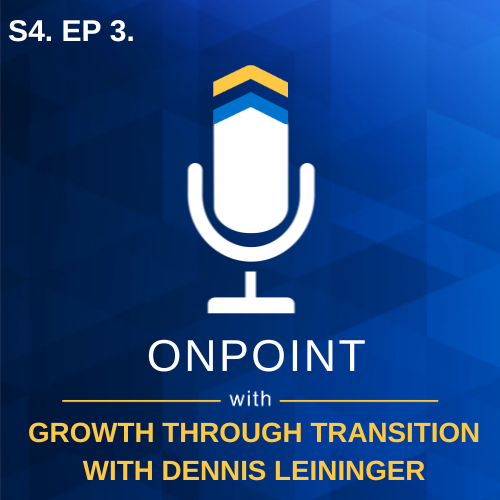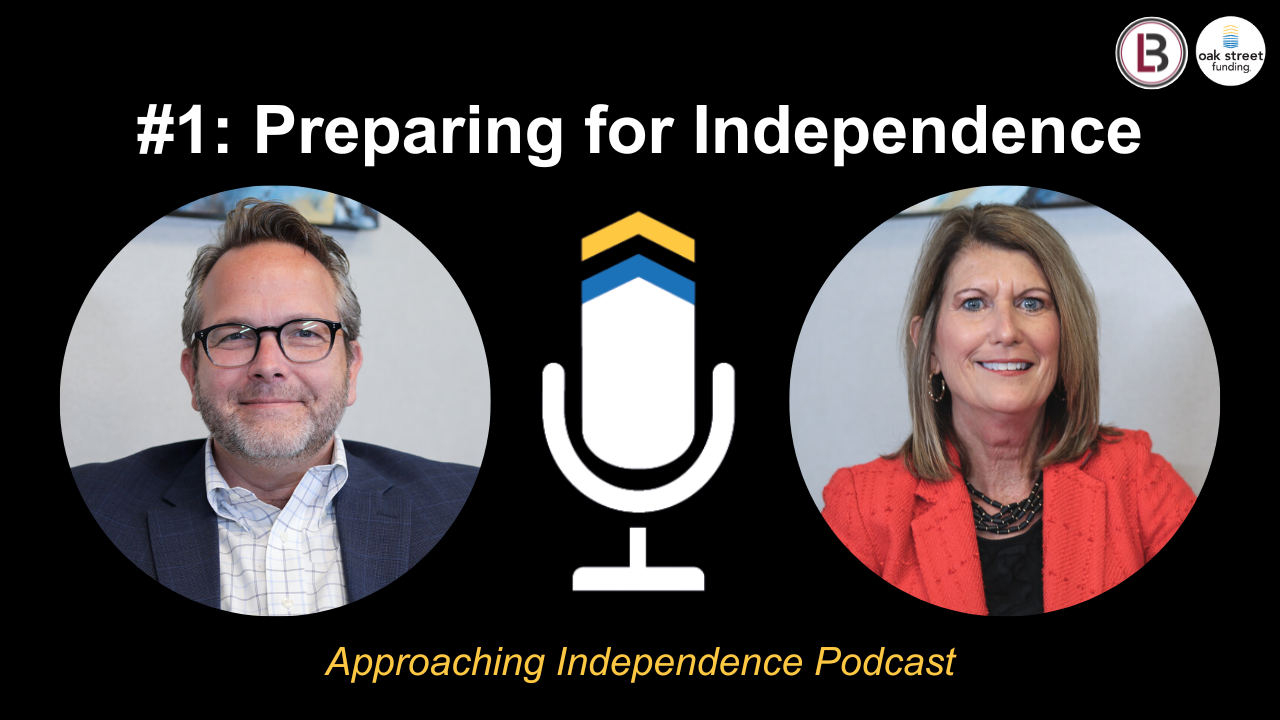S1. Ep. 5 - Managing a Business Through Decades of Disruption with Jim Roe of Arlington/Roe
- 0.5
- 1
- 1.25
- 1.5
- 1.75
- 2
Bridget Haight: Hi, and welcome to OnPoint, a podcast by Oak Street Funding, where we bring research and data backed insights to dig into the minds of industry leaders, to learn how to stand out, to navigate and to break through this ever changing industry. I'm your host, Bridget Haight, and you can support this podcast by following us on Spotify, Apple Podcasts, on our website, or wherever you get your podcasts. We will be there hanging out, talking to industry leaders, and ready to empower you to grow your business. Now let's get OnPoint. Today, I am happy to have Jim Roe, president and CEO of Arlington/Roe, managing general agency and wholesale insurance broker, headquartered here in Indianapolis. As a business owner since 1987, Jim has successfully navigated many disruptions that challenged his company. So the transition of leadership that occurred when you became the sole owner was a type of disruption. How did you navigate the difficult time after your father's passing?
Jim Roe: Well, it was a difficult time. I actually moved back to Indianapolis in 1980 to be partners with my dad. We were, as I may have mentioned, we were 50-50 partners. And as I said, every time we took a vote, I lost. But I was used to dealing with my dad and he gained more and more trust and respect for what I was doing. So in 1987, when he passed away suddenly, it was in terms of operationally, it was not real difficult to continue to navigate, to continue to grow. What was difficult was the personal side of it.
Bridget Haight: Sure.
Jim Roe: Trying to buy the stock from my mom. At that point in time, I have four siblings that were very interested in what was going on so trying to navigate through that. We changed our arrangement from, and I asked my mother this, from a corporate purchase to an individual purchase, which means that I had to pay with after tax income. So I had to make enough money to pay my mom off. I had to continue to put money and grow the business. I had to, or I was trying to raise my four children in private schooling. So that was very difficult at that point in time. But fortunately, also in the insurance industry in the property casualty side at that time, it was a difficult market. A tightening market. We called a hard market. So we were also able to grow our business because of some of that tightening and hardness of the market. Typically, in our end of the business, when the market is hard, which basically means there's less capital out there to chasing a lot of the risks, the prices go up. And obviously, when prices go up, we're the beneficiary of that.
Bridget Haight: Right.
Jim Roe: But that's how we made it through, you just take a deep breath and surround yourself with the best people and you'll make it through.
Bridget Haight: Is there anybody in particular that you relied upon?
Jim Roe: I had several people that I had recently hired. Those folks are retired at this point in time. I'm still at it. But I had a number two back then and I just got everybody together and said," Let's keep working at it. What do we do best? And let's continue to do whatever it is we're doing best. And the stuff that we're not as good at, let's see if we can shed that and downplay that." And at that point in time, in 1987, my dad had gotten to a point where he was just kind of doing some internal office things. So as I say, he wasn't as active operationally. So that really wasn't an issue but it was really the money piece of it, the financial piece, that was more of the difficulty. And you talk about the disruption of interest rates. I remember back in 1976, 1977 or 76 through 79, Vicky and I were actually in Bowling Green, Kentucky. And if anybody can remember that time, interest rates went through the roof. My boss down there at the time, and I was on the independent agent side, convinced me to buy a house so he could keep me there. He could make sure I was going to be a permanent resident. I didn't have the money, the down payment, so he helped me with that. And he convinced me that I was going to be making so much money that I didn't want to mortgage my house. I wanted to take a commercial loan and he had access. He was on the board and his dad was the chairman of board of a local bank. So I was able to get a commercial loan but the terms of that were prime rate plus 2%. The prime rate back then got up to 19%. I was paying 21% interest on my house. So talk about moving back up here, I still owed money down there. I was trying to buy a house here. A lot of juggling going on. Trying to grow the business, then a few years later, my dad dies. It was disruptive.
Bridget Haight: Yes.
Jim Roe: I haven't thought of it that way, but you work through it. You take a deep breath, you surround yourself with good people, you do the right thing, and things work out.
Bridget Haight: Yes. Well, a disruption that is a little closer to present time would be the Great Recession. So what lessons did you learn in the'80s that helped you through that time?
Jim Roe: That was probably one of the more difficult times we had. People are really special to me, but we had grown, we had expanded, we had bought a firm down in Bowling Green, Kentucky. We had opened up a couple other outside offices. Here comes the Great Recession and it was the only time in 2008 that we hadn't grown our business. We were down about a half a percentage point. A lot of our peers in the business were down 5%, 10%. Some of them went out of business during that time. We were able to stay afloat, but we had to eliminate some of the offices we had set up and eliminate some of the people. Maybe the second most difficult thing I had to do was tell people that they and their families, they don't get a paycheck anymore. We had to lay a few people off. That's the only time that I've had to do that in 50 years. I've been doing this now full time, 50 years, the only time that's happened. And I told my senior leadership, I don't ever want to go through that again. Because I realize it's a difficult thing for me to do, but obviously if I tell somebody they and their family don't get a paycheck anymore, I'm affecting those people's lives. I feel a great deal of responsibility for that. So that was a tough time.
Bridget Haight: I imagine. So how did you help your clients through that time?
Jim Roe: We just tried to be the best we could be, in terms of letting them know the services that we could offer, because they were all going through the same thing.
Bridget Haight: Right.
Jim Roe: And we want to be, we are a transparent company. So we completely tell our clients how much money we make off of it. We share the commissions that we get with them. And so we just try to be as open and transparent as possible so that they can grow with their clients as well. So, fortunately, we got through that time. But after that one year, 2008, we started growing again. I think, if I can remember, that back then we might have been in terms of premium size, we might have been around$ 120 million in premium. We just hit the$ 260 million premium mark. So we more than doubled since that time.
Bridget Haight: inaudible, goodness. So in times of disruptions, employee morale can decline. How do you boost morale as a leader?
Jim Roe: Well, again, try to be as visible as I possibly can. That's one of the reasons I don't get anything done in the day because I'm walking around talking to people. That's how I get information. That's how I hope I make them feel good about who they're working with. We're privately held, family owned. I have my two sons in the business now as owners. So be positive, be communicative, let people know what's going on. Nobody wants any surprises. But be open, honest, be visible.
Bridget Haight: Right. Okay. So one disruption that has been a constant throughout your entire career is technology.
Jim Roe: Well, actually a story about that. It was about the mid- 80's, and I don't know if my dad was still around, I think he was. But my office manager or my number two person, I said," You know what? I'm hearing everybody else is using these things called fax machines. We need to get a fax machine." And she said," Nah, we don't need that, I don't think that's going to last very long." I said," Nancy, I think we really need some fax machines." So we ended up buying fax machines. And in the early 80's, I think we might have gotten a couple of our first computers just to do more accounting type work than anything. We had to borrow money back then to get that. And that it's always difficult when you borrow money, because you're exposing yourself in terms of all your financials and who you are and what you do. So that was a difficult time. But the comment I would make about technology is, and I really don't understand it as well as I would need to, but I got plenty of people on board that do understand it. So surround myself, which is one of the things I've always tried to do, surround myself with people that are smarter than I.
Bridget Haight: Oh yes.
Jim Roe: And if I do that, then they'll make me look good. But one of the things that we've learned is we want to be on the leading edge. We don't want to be on the bleeding edge because you could sink a lot of money into technology, or into anything for that matter. If you don't understand what you're getting into, then you're not sure what the results are going to be. I don't want to go back to my people and say," I wish I could give you raise. I wish I could pay you more. But we made a mistake making these decisions and buying stuff that we didn't need." What that does in my mind is creates mistrust. So the next time I say, let's go ahead and do something. If they don't think that's the right answer, then I won't have the instill the trust in those people that I need for us to continue to grow.
Bridget Haight: And in digital world, it changes so rapidly. I mean, I think what you just said about surrounding yourself with people who really know that side is the smartest thing you could do.
Jim Roe: In any event, our business is all about people. And technology is there just to serve, try to find a way to make it easier, faster, quicker to get things done. So we need to understand what that is, but we can never get away from dealing with people.
Bridget Haight: Right. Speaking of dealing with people but back to your employees. Many people are resistant to change. So how did you help your employees, how did you train and adapt them to new technologies, as they came along?
Jim Roe: Well, we have to constantly learn. I ask some of our newer people when I walk around towards the end of the day, I say," Hey, what'd you learn today?" We need to constantly be learning something new every day. I hope I'm learning something new every day. So it's a matter of teaching. How do we put people in a position where they want to teach and lead somebody else? In fact, I consider if not my most important job, is one of my most important jobs, is to teach. Is to teach people what I think I know. That may not be much, but constantly telling other people how they can get better at their job and that includes technology. And don't be afraid to reach out to somebody else. In fact, reminds me of the three rules. We only have three rules in our company because I can't remember anymore than those.
Bridget Haight: What are your three rules?
Jim Roe: Do the right thing. Second rule is don't screw up. What does that mean? Well, if you're not sure what that means then go back to number one and ask somebody for help. And the third is have fun.
Bridget Haight: Have fun. Sounds like kindergarten.
Jim Roe: Well, that makes it pretty easy doesn't it? I have a story. One time I'm wandering around my office and I walked into one of our managers offices and I said," Hey, how's it going?" And she said,"Well, it's okay." So I closed the door, I sat down, and I said," Okay's not good enough. What's going on? We need to talk. Whatever is not happening the way you want or what is happening, we need to figure out what's going on. How can I help with that? So let's have fun." Now we can't have fun every single day.
Bridget Haight: No.
Jim Roe: But if you get out of bed in the morning and you don't want to go out and change the world, you don't want to go to work, there's something wrong. We got to figure out how do we change that? And that may be go find another job. And that's something I've tried to do with people, is that if you're not having a good day and you don't really love what you do. If you love what you do, by the way, it's not work. But if you don't love what you do, let me help you find something that you really do.
Bridget Haight: That's great. That's great. So, of course, the most recent disruption has been the pandemic. How have you led your company through pandemic times?
Jim Roe: Well, one of the things, again, to do is to listen to everybody. So I mentioned earlier that we have a whole floor, we have about 110 seats in Indianapolis in our office. We have about 200 total people, about 110 or 120 are in Indianapolis. We have, for the last couple years, we have maybe 15 showing up for work.
Bridget Haight: Wow.
Jim Roe: And we had a record year last year, and we had a record month in January, and we just finished March with a record month.
Bridget Haight: That's amazing.
Jim Roe: Well, why do we need to change what people are doing? And I can't tell you that all of my management team agrees with it, but let's manage people. In fact, I don't like that term, even. I don't like... I told you my best book or the book I like is Contrarian Manager. I prefer to be a leader. And if you're a leader and you turn around and there's nobody behind, you're not going to be very effective. So how do we lead? We lead people, we manage stuff. We manage paper, we manage computers, we manage technology, but let's lead people. So the way to do that is to ask. Although, when you're in a huddle and you're the quarterback, we only have 30 seconds to make a decision on what the next play's going to be. Let's not have a committee meeting. Now, somebody's got to be in charge every once in a while. If the fire alarm goes off, let's not have a committee meeting, let's get out of the building. But that's how I've tried to do through this pandemic is lead by focusing on how are we serving our clients and what are the results of that. Let's view what we're doing by results in that by activity.
Bridget Haight: So have you had to be flexible with your scheduling? I mean, you say that all these people are working from home, has that been easier or have you enjoyed being able to give people that flexibility?
Jim Roe: Well, according to our results, it's working. I asked one of our young men who's on our healthcare and human services team, I asked him about his schedule, I said," How's it going, working from home? And he said," Well, my alarm goes off at 7: 50 and I'm at my desk by eight o'clock." And especially, with the inflation that we're experiencing now, the gas prices and all that, people are saving time by not having to commute and they're obviously saving a lot of money.
Bridget Haight: Yes.
Jim Roe: By not having to do that. But Teams and Zoom and that technology has really helped by. We're still able to look at each other, but it's not the same. This conversation that we're having, we're looking at each other, we can be doing the same thing over Zoom or Teams, but be it wouldn't be the same as being with you here. So that long term is something that concerns me.
Bridget Haight: Right.
Jim Roe: Especially, with the young folks, is if we're not together, how do we make sure that we're continuing to develop those relationships, continue to learn.
Bridget Haight: Connect, yeah, right.
Jim Roe: Connect. Exactly.
Bridget Haight: Wow. Can you tell me what is your number one tip for other business owners who do face disruptions, such as the ones we've talked about?
Jim Roe: Focus on the results, like I talked about, not the activity. Listen, continue to build, as we like to say in our business, stakeholders. You could be a shareholder, you know my story about my dad, I was a 50-50 partner and I lost every time we voted. So you can be a minority shareholder, but that doesn't necessarily get you a whole lot. Be a stakeholder. Have a key stake in your business and find a way to create value every single day. One of the things that when they let me talk to people in terms of new hires, let's hire and train adults. One of my questions or might be, are you an adult, in an interview? What kind of question is that? But we want to hire people that can use their own judgment. Do you have good judgment? And if you don't have good judgment, you can't work here. Because I don't want... I'm an insurance buyer and I'm going to a specialist like we are and we don't use good judgment and we don't have good knowledge, then it's probably not going to be a very good relationship. So put the right people in the right seats too. Make sure that people are doing what they really enjoy doing as opposed to what you tell them to do. I've never been a teller. I'm a seller. Find out what somebody needs and wants and put them in that position. If it doesn't work out, if it's not the right position for them, help them do something they really enjoy.
Bridget Haight: I love that. Words of a good leader. So we read and we hear a lot of these days about the value of modern leadership and transformational leaders. Would you say that leadership, that your leadership style, is important during times of disruption?
Jim Roe: Well, I hope so. I hope that what happens and what is happening in our business is we're growing. And why is that? Well, it's because of the people. It's because of the people doing their job, whether they're sitting at home and getting up at 7: 50 and at their desk by eight o'clock and they haven't showered and they haven't shaved and they, I hope they have clothes on. But if the cameras aren't on, who cares? So what does the client need and let's provide it for them. And by the way, every one of my staff members, they're a customer of mine. I have to figure out what it is I can do to help them grow in their own life. Or why would we be any different than anybody else? If you're not different, in terms of what you do and what you provide for people, then the only differentiator is money and benefits. We're not going to win on money and benefits. How can we be a factor in changing and bettering somebody's life?
Bridget Haight: I feel like you've answered this in many ways already, but how would you describe your leadership style? Obviously, supportive is-
Jim Roe: I actually looked this up and I found one article, I guess it was, six management styles. So coach, listener, problem solver, innovator, planner, free spirit. I hope I have a little bit of every one of those-
Bridget Haight: Of all six, yeah.
Jim Roe: And it all adds up to a leader. And it goes back again to, are you somebody that other people want to follow? So that's my goal.
Bridget Haight: Great.
Jim Roe: Is how can I be the leader that people will want to follow and do the right thing, don't screw up, and have fun?
Bridget Haight: To have fun. Love it. Well, wonderful. I have one last question before you go. If you won $10 million tomorrow, what would you spend it on?
Jim Roe: Well, first of all, the question would have be to be, do I win it personally? Or do I win it through the business?
Bridget Haight: Let's say you win it personally.
Jim Roe: Yeah, but actually the answer is either or both, I guess. I would give it away. I would find... First of all, I have to pay taxes on it, if I win it.
Bridget Haight: Sure.
Jim Roe: So, the US, the governments gets a big piece of that. But I would find a way to, if it's business, continue to invest that money in our business, and I'd find a way to help people that are less fortunate than I am. By the way, you haven't asked, but I'll tell you my definition of success.
Bridget Haight: Tell me.
Jim Roe: It's not the guy who dies with the most toys. And unfortunately, there's a bumper sticker like that," The most successful guy dies with the most toys." Unfortunately, I've been to way too many funeral homes. I've never seen those toys. So the definition of success, in my mind, is what's our legacy. What do we want people to say about us when we're gone? Why don't we work real hard they say that about us when we're here? How can we influence other of people's lives? That's my definition of success.
Bridget Haight: I like it. Thank you all for listening to OnPoint, a podcast by Oak Street Funding, where we bring research and data backed insights to dig into the minds of industry leaders, to learn how to stand out, navigate and break through this ever changing industry. I am Bridget Haight, and tune in next time, wherever you listen to podcasts, to hear Rick Dennen share five lessons on debt and equity. See you then as we get OnPoint. Don't forget to subscribe and leave us a review.
DESCRIPTION
Oak Street Funding is happy to be joined by Jim Roe – president and CEO of Arlington/Roe, a managing general agency and wholesale insurance broker headquartered here in Indianapolis. As a business owner since 1987, Jim has successfully navigated many disruptions that challenged his company including the death of his father and business partner, the Great Recession, interest rate spikes, the pandemic, and now the Great Resignation. Hear from him on managing businesses during disruptive times right here!
Want to learn more?
Call 844-353-8022 to speak to an Oak Street Funding team member today.
Today's Host
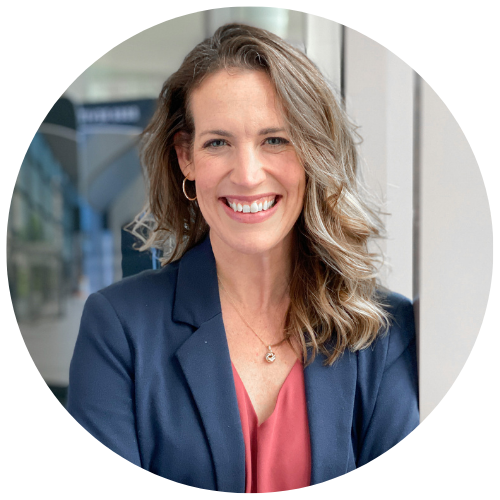
Bridget Haight
Today's Guests
